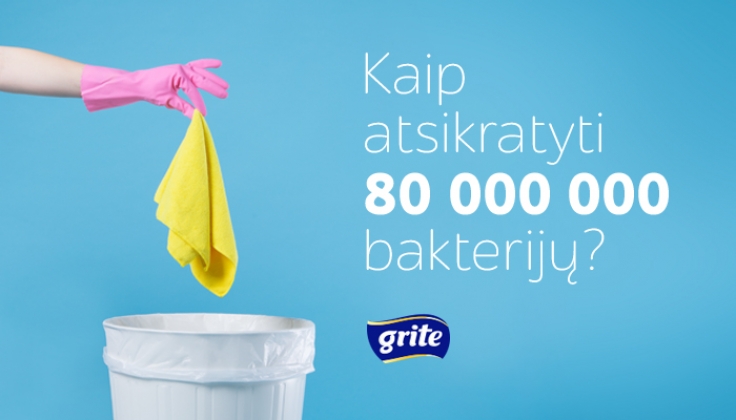2017 03 01
Grigeo Grigiškės AB brand Grite takes good care of our environmental cleanliness and hygiene. The results of the survey, initiated by the company, surprises and makes us ponder.
Even a clean kitchen towel has got 26 times more bacteria than there are residents in Lithiania.
Even clean kitchen towels are teeming with a variety of yeast and mould as well as bacteria harmful to human health. These are the results of a bacteriological analysis of kitchen towels initiated by Grite, a tissue paper manufacturer, and carried out by the National Food and Veterinary Risk Assessment Institute.
The Institute tested cotton towels that had been used for three, seven and fourteen days. The results showed that there was an abundance of pathogens on the towels, regardless of the duration of use.
“We found that the bacterial content of 1 gram of a towel was incalculable, with the mould count as high as 190-300 units per gram. And it does not matter whether you change the towels less frequently or every few days, because even towels used for just a few days were found to be home to countless bacteria,” Česlova Butrimaitė-Ambrozevičienė, head of the Bacteriology Unit at the National Food and Veterinary Risk Assessment Institute, said in comment on the analysis results.
What diseases are we exposed to?
Professionals point out that we do not live in a sterile environment, so we should not worry about the bacteria in some cases. However, we should be cautious about the kitchen environment, because food can be a root of entry for a number of disease-causing bacteria into the human body.
“Kitchen towels provide a perfect medium for various bacteria colonies and mould to grow, as they are often soiled with food residues, the towels are often wet and are not fully dried. A large number of bacteria discovered during the analysis may pose a risk of salmonellosis, and coliform bacteria (verotoxigenic) can cause diarrhoea,” Česlova Butrimaitė-Ambrozevičienė said.
According to the specialist, the analysis has also shown that even a clean washed towel is not completely clean. “We found about 80 million bacteria in one gram of a washed towel ready for use in the kitchen. Naturally, the level of bacteria may also be affected by softeners and fragrances used for laundry, as well as the items washed together,” Česlova Butrimaitė-Ambrozevičienė added.
How often should we change kitchen towels?
Ideally, a towel should be changed after each use, but it would be inconvenient in everyday life. To avoid contact with the bacteria, mould and yeast in the home environment, cotton kitchen towels can be replaced with alternative disposable tissue paper. It is disposed of after use, so there are no conditions for bacteria to grow and spread on clean dishes and various kitchen surfaces.
“We decided to test kitchen towels for comparison purposes. The National Food and Veterinary Risk Assessment Institute analysed Grite tissue paper and found no harmful microorganisms specific to kitchen towels. It is natural, because the hygiene standard requirements for tissue paper are very stringent – the paper is suitable for direct contact with food,” Vilija Utkuvienė, quality engineer at Grite, said.



